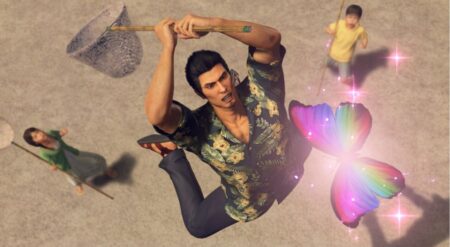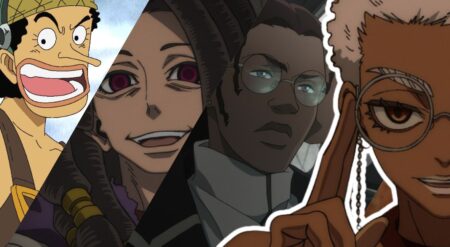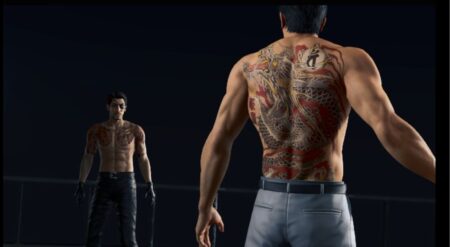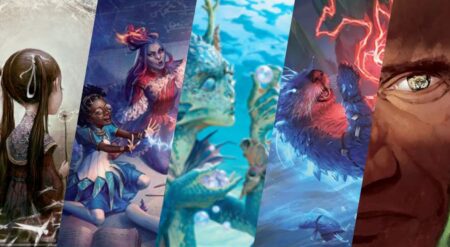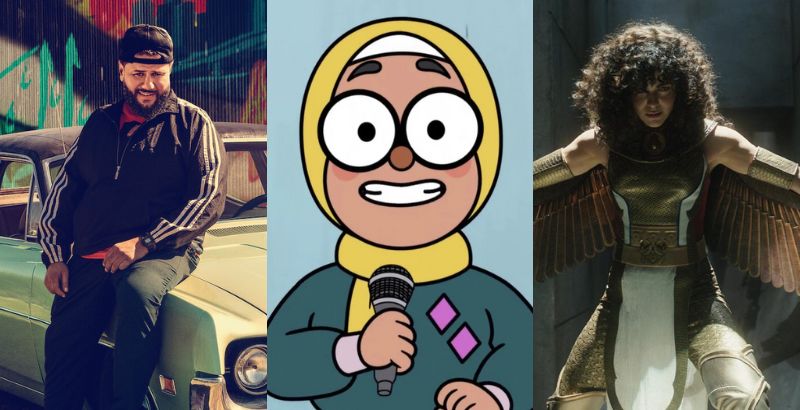
Three years ago, I wrote a piece for But Why Tho? bemoaning the abysmal state of Southwest Asian and North African (SWANA, AKA “MENA”) representation in popular film, TV, and comics media. I’m very happy to say that in the last few years, and in particular in 2022, the state of representation for SWANA peoples in mass media has markedly improved. However, there are certainly various challenges that remain. Especially with the continued barrier that Orientalism pervades in gatekeeping SWANA voices out, showing audiences how others think of us instead of allowing us to tell our own stories.
First things first, we use the term SWANA (or MENA) to refer only to the collective geographic regions of North Africa and West Asia that have many different peoples, cultures, religions, and traditions. While there are some shared cultural and religious traditions shared across them—the region is diverse, and popular media in the west and elsewhere has nowhere near reflected the crucial specificity of all these various peoples. But again, with more specific stories coming out in the last year or so, we are starting to see a shift away from SWANA representation as a monolith.
The Swimmers
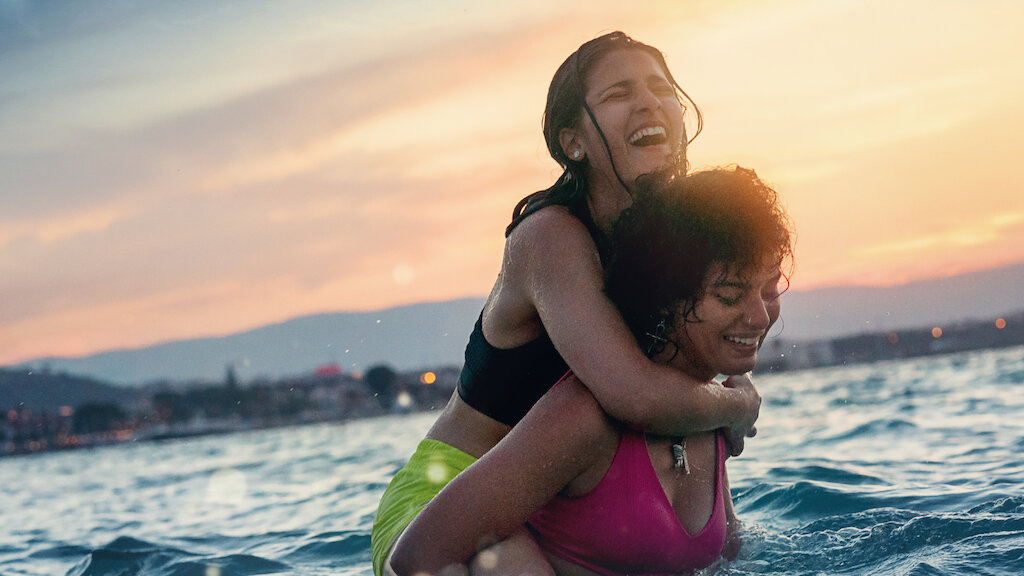
One of the most gratifying examples of this is The Swimmers, which just debuted on Netflix. In this beautiful story directed and co-written (with Jack Thorne) by Egyptian-British director Sally El Hosaini, we see the true story of the Mardini sisters (played by real-life sisters Natalie and Manal Issa) and how they made the refugee journey from war-torn Syria to Germany, and how Yusra made it to the Olympic Refugee Swimming Team in the 2016 Olympics.
El Hosaini, with input from the Mardini sisters themselves, brilliantly brought a caring vision about the journey they and too many other refugees from SWANA (along with Africa, and Central and South Asia) must make to escape violence and persecution, only to be met with racist treatment in western countries that continue to cruelly rebuke them. Taking the time to get the details right about the Syrian and refugee experience, El Hosaini and her whole team created a groundbreaking film for not just SWANA stories, but refugee stories in popular media. We need so many more of them.
Mo

Also debuting on Netflix this year was comedian Mo Amer’s (with co-creator Ramy Youssef) brilliant and moving series Mo, based off of his own experiences growing up in Houston, Texas. For the first time ever in American television, we had a Palestinian family refugee story. Both tragic and comedic as we see Mo Najjar, his mother Yusra (Farah Bsieso), brother Sameer (Omar Elba), sister Nadia (Cherien Dabis), girlfriend Maria (Teresa Ruiz), and friend Nick (Tobe Nwigwe) deal with the travails of daily life as Mo and his family carry the trauma of their Palestinians refugee history and status. They can’t even be citizens as the broken U.S. Immigration System doesn’t allow for that, along with thousands of other Black and brown refugees and migrants. Funny and heartfelt as Mo Amer and his creative team tell this distinctly Palestinian story (again, we need many more of them), Mo is a groundbreaking achievement. We need Season 2 greenlit now Netflix!
Ramy

Speaking of Palestine, we got to see the country in Season 3 of Egyptian-American Ramy Youssef’s hit Hulu series Ramy, which debuted its third season this year. Telling the continuing story of the dysfunctional Egyptian-Palestinian-American Hassan family, this season delved into Ramy’s mother’s (Hiam Abbass) and Uncle Naseem’s (Laith Nakli) Palestinian side through a trip to Jerusalem. And knowing the various moral complications of Ramy, it’s not necessarily for the best reasons. Not all representation needs to be morally upstanding, and indeed, the Hassan family fits that complicated bill. Critics saw the inclusion of Palestine and showing the abuses Palestinians endure from Israel as groundbreaking, once again showing just how necessary Palestinian stories are.
Dead End: Paranormal Park

In animation in 2022, Iranian and Muslim audiences met the wonderful Badyah (voiced by Iranian-American actress Kathreen Khavari) in the 2022 Netflix series Dead End: Paranormal Park. Badyah is an inquisitive and bright character who is always there to support main protagonists Norma (Kody Kavitha) and Barney (Zack Barack), but never is lost in the background as we get interiority from her as well. Her presence on the already wonderful and diverse Dead End. Audiences were left with so many questions after the end of the second season that debuted in October, and hopefully Netflix renews it to continue the story.
Moon Knight

The MCU’s Moon Knight may not have been perfect, cramming perhaps too much to tackle in six episodes, but critics and audiences hailed the presentation of present day Egypt and ancient Egyptian mythology and culture by Egyptian series head director Mohamed Diab. Refreshingly taking Orientalist stories from Marvel comics and dismantling their racist and exotic overtones, Diab succeeded at infusing cultural specificity into the story that was always based in Egyptian concepts. Steven Grant/Marc Spector’s (Oscar Isaac) journey was all the better for that. The presence and centering of the Egyptian Layla El-Faouly (played by Palestinian-Egyptian actress May Calamawy) solidified this effort, with Layla more than holding her own next to Issac’s protagonist. With Calamawy’s superb performance, Egyptians, Arabs, and other SWANA people now have their own riveting hero to root for in the MCU. Hopefully there will be many more in Marvel and DC in the live-action space.
Squire
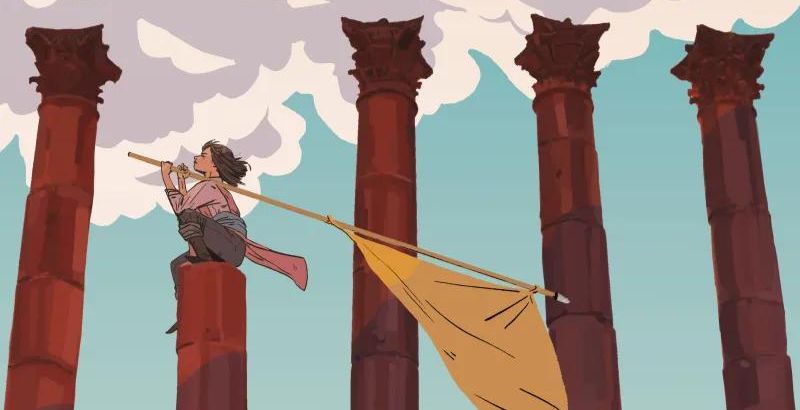
In the comics realm, the brilliant Palestinian writer Nadia Shammas with stellar Jordanian artist Sara Alfageeh brought us Squire, a thrilling Arab and SWANA fantasy graphic novel depicting an alternate history of empire and conquest. With Alfageeh’s immersive art that beautifully displayed the cultures of the SWANA region and Shammas’ deeply resonant and incisive commentary into nation myth-making and Empire, this is a standout work. The story resonated with SWANA audiences and beyond, establishing Alfageeh and Shammas as masters in their respective arts. For their groundbreaking work, Shammas and Alfageeh won a Harvey Award at this year’s NYCC.
Even besides these examples listed above, there’s even more visibility for SWANA audiences from this year. Iranian actresses Nazanin Boniadi and Sophia Nemvete play two of the main roles in Amazon Prime’s The Rings of Power, with the Moroccan-British Yasen ‘Zates’ Atour joining the cast as well in the second season, along with Moroccan-American director Sanaa Hamri. The Sudanese-British Amir Wilson played the main role of Will in HBO/BBC’s His Dark Materials, which just concluded with its brilliant third season.
Adding to the SWANA representation, Egyptian-American actor Abubakr Ali starred as the main love interest in Billy Porter’s directoral debut Anything’s Possible on Amazon Prime. Farha, a Jordanian-produced film displaying one of the many tragedies of the Nakba for Palestinians, just debuted on Netflix to critical acclaim. Even though the MCU’s Ms. Marvel is South Asian and not SWANA, her Pakistani background and family have cultural similarities that many SWANA people can relate to, along with SWANA characters in Nakia (Yasmeen Fletcher) and Sheikh Abdullah (Laith Nakli). When you add all of these up, we can count much more thoughtful representation than we’ve seen before.
But that doesn’t mean that everything is solved. We have a long way to go before we break into the presence in mass media that we deserve, and feel free to play roles and create stories as easily as white actors and creators are able. We’re still in the same boat as virtually all other marginalized groups, yet we’ve come far in 2022. While I’m glad I can point to more concrete examples from this year, I can’t wait until there’s too much to count. Hopefully, that kind of SWANA representation starts to happen in 2023.


